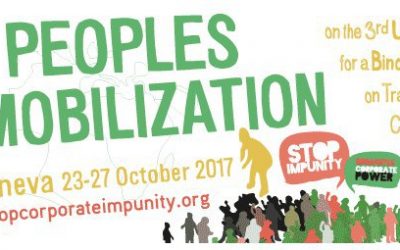The global campaign is a network of over 200 social movements, organizations, networks and affected communities resisting the land grabs, extractive mining, exploitative wages and environmental destruction of transnational corporations in different global regions, particularly Africa, Asia and Latin America.
Being from Africa and dealing with advocacy on extractives characterized by transnational corporations, the Natural Resource Alliance of Kenya (KeNRA) is part of this campaign. The campaign is a people’s global structural response to unaccountable corporate power. It provides facilitation for dialogue, strategizing, exchanging information and experiences and acts as a space to make resistance visible and deepen solidarity and support for struggles against TNCs.
In Geneva October 21st to 27th, more than 200 delegates from over 80 countries representing social movements, trade unions, global civil societies including communities affected by human rights of transnational corporations were actively involved in the third session of the open-ended intergovernmental working group for the elaboration of an International Legal Binding Instrument on TNCs and Other Business Enterprises (OBEs) with respect to human rights.
Corporate accountability issues have been global in nature, with concrete impacts at the local and national levels, and different challenges connected to national-level businesses, State-corporate partnerships, and increasing transnational corporate activity. By this, the Corporate Accountability Working Group and allies work collectively to actively strengthen the international human rights framework on corporate accountability.
The Campaign Proposes an International People’s Treaty that provides a political framework to support the local, national and international movements and communities in their resistances and practices of alternatives to corporate power and the TNC model of the economy. The campaign also participates for UN Binding legislation to regulate TNCs, stop human rights violations, end impunity and ensure access to justice for the affected communities.
For more than a decade, ESCR-Net members have been taking collective action to advance the development of a clear and comprehensive international human rights framework on corporate accountability, including an international binding treaty on human rights and business.
The process of drawing up a binding treaty is now underway due to the will of those affected by the violations to arm themselves with an international legal instrument. 95 countries were present at the talks, a remarkable number for such an intergovernmental working group. In addition, members of parliaments from more than 20 countries and the European parliament, over 700 civil society organizations have indicated official support for the process.
The treaty provides an important opportunity to address the ways that TNC-OBEs unduly influence government or public institution policy formation, decision-making and regulatory oversight, in order to promote their interests over human rights and environmental standards and protections.
The scope of the legally binding instrument on TNCs and OBEs with respect to human rights was one of the four topics discussed during the first two sessions of the convening in Geneva. From the constructive debate that took place, different interpretations of the relevant reference in Resolution emerged and several proposals from States and other stakeholders were made. The objectives of the convening included;
- To create an international legally binding framework that aims to guarantee the respect, promotion and protection of human rights against violations or abuses resulting from the activities of TNCs and OBEs, in order to ensure civil, administrative and criminal liability of TNCs and OBEs regarding human rights violations or abuses.
- To facilitate the full implementation of the primary responsibility of the State and fundamental freedoms against human rights violations or abuses within their territory and/or jurisdiction, committed by TNCs and OBEs.
- To ensure that the activities of TNCs and OBEs fully respect human rights.
- To include preventive measures for tackling business human rights violations or abuses.
- To ensure adequate access to justice for victims of human rights violations or abuses resulting from the activities of TNCs and OBEs.
- To establish/strengthen effective remedy mechanisms, for victims of human rights violations or abuses perpetrated directly or indirectly by TNCs and OBEs.
- To strengthen international cooperation, including mutual legal assistance to tackle business enterprises human rights related violations or abuses.
- To reaffirm the primacy of human rights law over trade and investments agreements and establish specific State obligations in this regard.
According to the Universal Declaration of Human Rights (articles 7, 8 and 10) “all are equal before the law and are entitled without any discrimination to equal protection of the law”; “everyone has the right to an effective remedy by the competent national tribunals for acts violating the fundamental rights granted him by the constitution or by law”, and “everyone is entitled in full equality to a fair and public hearing by an independent and impartial tribunal, in the determination of his rights and obligations and of any criminal charge against him”. In real situations however, inequality of arms is present and the big economic power of TNCs and OBEs and their influence on political and judicial officers, may play a crucial role to limit the actions or to persuade the victims not to seek justice.
Why the Binding Treaty is important
- Human rights should prevail over investor rights.
- More than 3400 treaties and agreement protect transnational investments, while no legal instrument ensures respect of human rights or of the environment.
- A binding treaty shall state complicity with human rights abuse and ensure regulation of corporations within the borders.
- Corporate capture of governments and UN institutions is dangerous and corporate lobby should come to an end.
By Mulehi Anne

